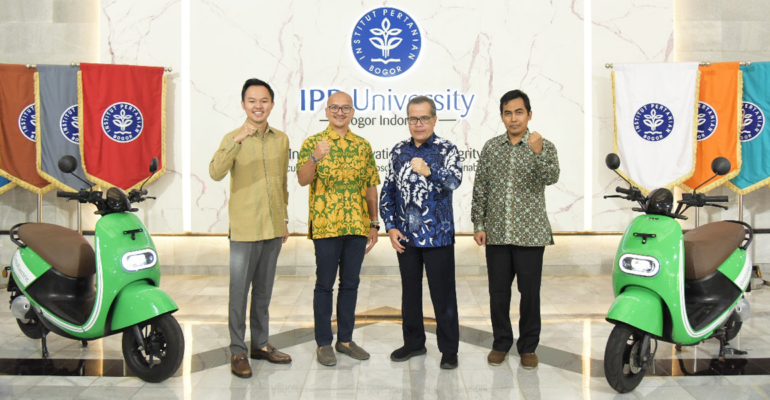Providing Electric Motorbike, IPB University Collaborates with Grab to Support Carbon Emission Reduction

In order to support the effort to reduce carbon emissions on campus, IPB University is collaborating with PT Grab Teknologi Indonesia. From this collaboration, IPB University received a grant from Grab in the form of ten electric motorbikes. The signing of the memorandum of understanding between the two parties took place at IPB Dramaga Campus, Bogor (24/10).
Vice Rector of IPB University for Global Connectivity, Collaboration and Alumni Relations, Prof Iskandar Z Siregar hopes that the collaboration with Grab can answer the triple planetary crisis: climate change, biodiversity loss and water pollution.
“IPB University is competent for biomaterial research such as helmet innovation from empty palm bunches (TKKS) in order to achieve the goal of reducing carbon emissions. Economic gaps must be sought continuously so as to encourage sustainable economic growth,” he said.
Prof Iskandar also said that currently Grab has become a decacorn because its capitalisation value is above 10 billion USD. “I once read an article about the statistical growth of a country. One of the indicators measured is to have more than ten unicorns in the country,” he said.
Moreover, he revealed the value of economic growth in Southeast Asian/ASEAN countries, 50 per cent of which is already held by Indonesia. “With this capital, we must be optimistic about Indonesia’s progress in 2045,” he said.
For this reason, continued Prof Iskandar, currently IPB University continues to work hard to produce graduates who are agile learners. IPB University graduates are directed to become a techno sociopreneurship that is adaptive to future developments that are increasingly difficult to predict.
Meanwhile, Grab’s Board of Directors, Kertapradana expressed his gratitude and happiness for being able to work with IPB University. According to him, IPB University is an institution that has many innovations that have a positive impact on society.
“The consistency of the innovations produced by IPB University, 40 percent are to help drive the economy and sustainability of nature,” he explained.
Furthermore, Kertapradana revealed that Grab has declared that the company has a triple bottom line. First, the company’s evidence value must achieve positive results. Second, Grab’s partners have a good livelihood. Third, in terms of sustainability, Grab has committed to reducing carbon emissions.
“Through this collaboration, there are similarities in vision and mission with IPB University that can be collaborated. This collaboration can include introducing electric vehicles to the campus community. Furthermore, we will help digitise the canteen at IPB University so that the market can be opened from outside the campus. In addition, we will also help revitalise the assets at IPB University,” he said. (dr/Rz) (IAAS/RUM)


